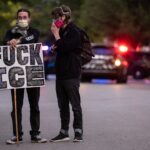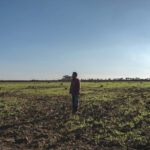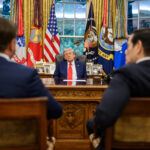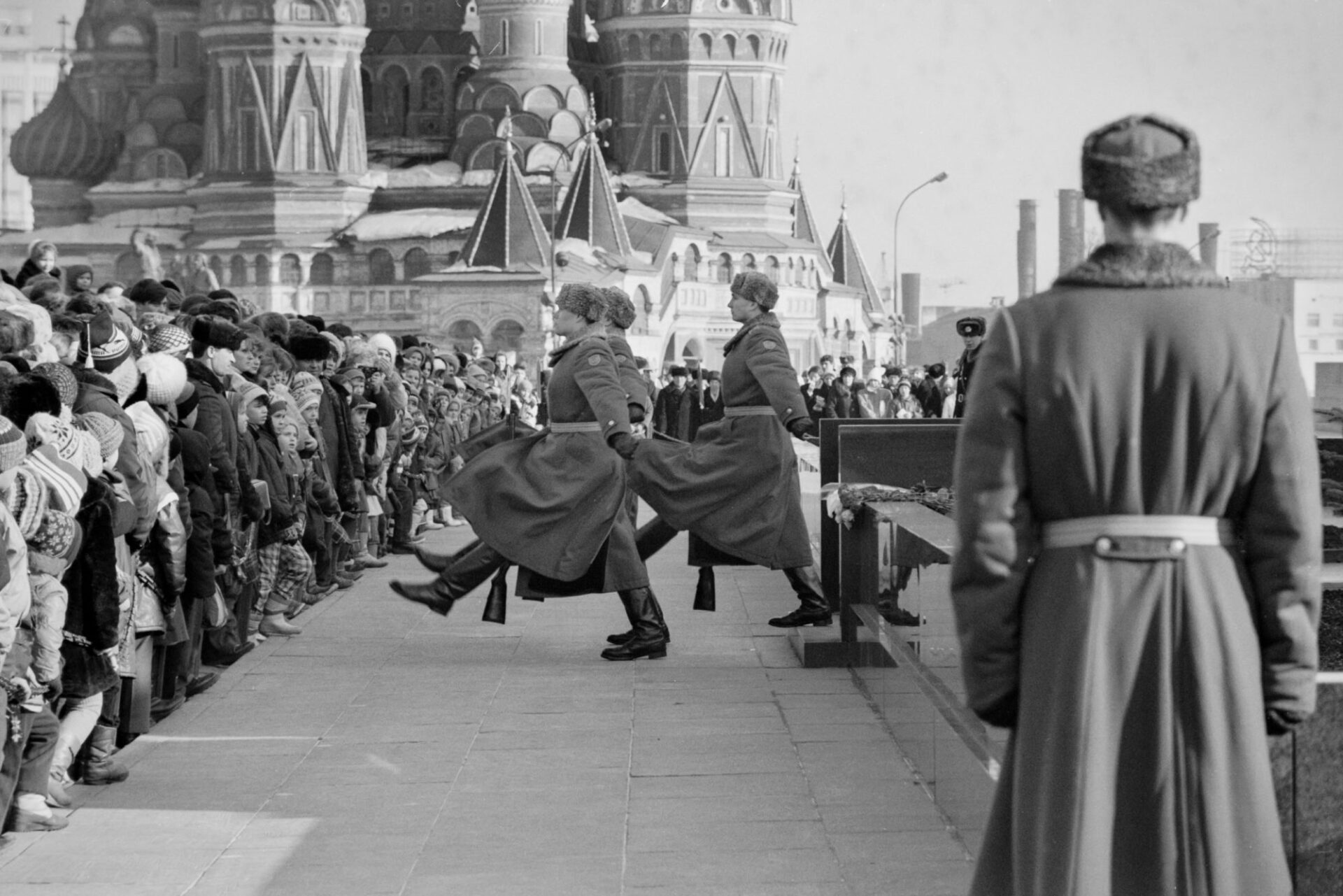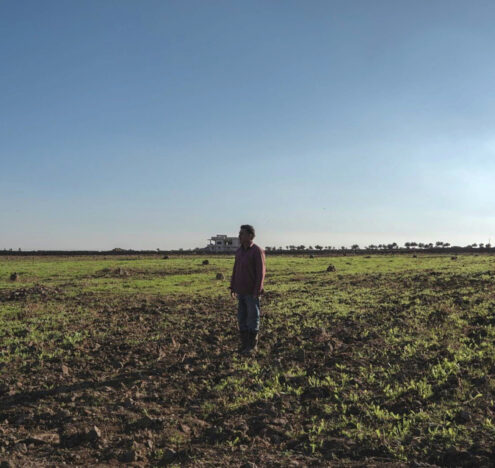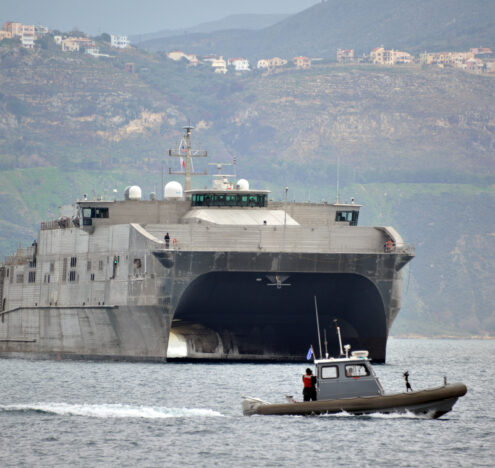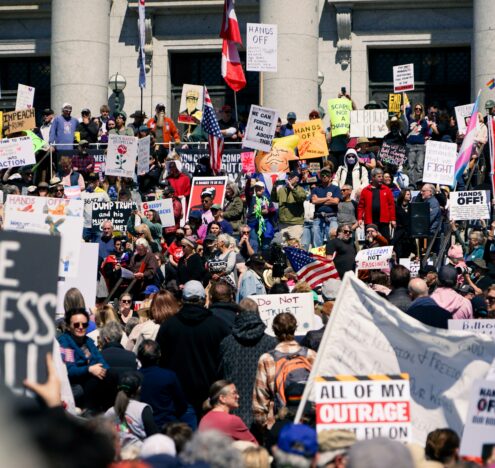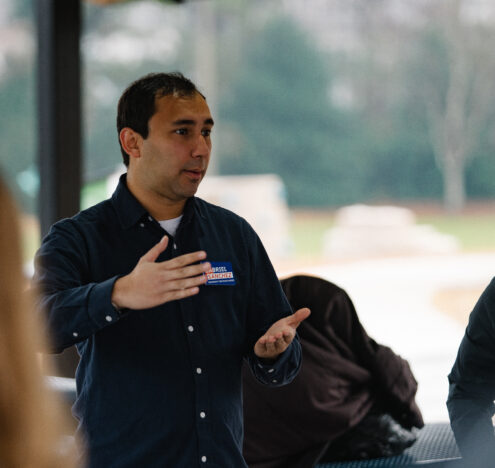As the Russian invasion of Ukraine nears its one-year mark, reporting from the conflict zone has become a rote cycle of casualty numbers, stark portraits of bombed-out buildings, and the kind of geographic push-pull that defines terrestrial warfare. The supposed ground zero for the battle between democracy and autocracy has, like so many other protracted supranational conflicts, lost its place at the front of the Western consciousness and joined the rest of the deluge of information caught in the digital slipstream.
But during the initial occupation of Ukraine, the Western media complex was entranced. As thunder and rockets fell down on Kyiv, Odesa, and Mariupol, more than just seasoned war journalists joined the fray. Indeed, an entire horde of pundits descended on the topic, eager to stake their claim as authors of the narrative.
From the center-left and right came the usual saber rattling and liberal internationalism that has defined the End of History. The reactionary right spun a story about the urgency for isolation and the threat of globalist conspiracies. Technocratic, handwringing liberals “discovered” the roots of the conflict in the 10th century and the origins of the Ukranian-Russian ethnic divide. For the anti-war Left, who had insisted that no siege would come to pass, a hyper fixation on the encroachment of NATO onto Russia’s border — a perspective that neglects President Vladimir Putin’s blood and soil angle in favor of broad (though not entirely unjustifiable) “America bad” rhetoric.
Indeed, if you were starved for comforting tales colored with Manichaean morality, the beginning of this past spring was a smorgasbord.
Yet, almost the entirety of the Ukrainian discourse and its commentariat authors seemed to suffer from amnesia. Rarely was a word spoken about the crucial events leading up to the creation of the modern Russian state, one of the most urgent events of the past 30 years. The transition from communism to capitalism in the former Soviet Union provides us a benchmark for understanding how such a convoluted and economically volatile country like Russia would embark on a suicide mission. And, furthermore, how the mercurial leader behind this geopolitical kamikaze came to power.
A BRIEF HISTORY LESSON
To come to terms with the crisis unfolding in Ukraine — from a materialist perspective — we must understand the conditions that permitted Putin to maintain his executive stranglehold for the past two decades. Here is where the antecedents of his particular brand of realpolitik can be illuminated.
Following the collapse of the Soviet Union, then-President Boris Yeltsin — in partnership with the Clinton administration and the International Monetary Fund (IMF) — pursued a highly volatile economic strategy: shock therapy. As chronicled in Naomi Klein’s influential book “The Shock Doctrine,” this method of economic policy involves intentionally creating massive amounts of inequality within a country’s financial and social systems in order to manufacture a new, hyper-laissez-faire arrangement wherein citizens are no longer protected from the gravity of market forces.
The United States was heavily invested in the Russian transition from communism to capitalism and poured billions of dollars into the country on the condition that certain shock policies be implemented. With the Russian economy in shambles following the dissolution of the Soviet Union, Yeltsin was happy to receive aid that would hypothetically stabilize the country.
Early on in the transmogrifying process, the budding Clinton administration was so adamant about providing economic aid to Yeltsin that it coerced the IMF into lowering its standards and conditions for loaning money of dollars to Russia, effectively discouraging the Yeltsin regime from meeting any meaningful benchmarks or reforms.
Overnight, Russian state assets and industries were stripped for parts, public employment numbers shrank, price controls on essential goods were lifted, and the welfare system was dismantled.
Indeed, the United States had invested billions of its own dollars into the creation of the contemporary Russian economy. Western economists like Jeffery Sachs, working in concert with Deputy Prime Minister Anatoly Chubais, were dispatched to the Kremlin to guide the country through the choppy waters of economic reform.
The prescription, however, for Russia’s floundering economy was kept intact: State spending was undercut between 30-50%, creating markets where none had existed. This generated artificial precarity to force individuals into said marketplaces and allowed high levels of foreign investment and financialization to take place.
Unfortunately, the combination of Russia’s hyper-capitalist transformation paired with a still nascent “liberal democracy” proved inadequate. Corruption was ubiquitous, and the newly formed institutions within the Russian Federation, such as financial regulatory agencies, criminal justice enforcement, and proper infrastructure planning, proved inept at curtailing the profiteering wrought by the fiscal feeding frenzy of domestic and foreign investors alike.
Overnight, Russian state assets and industries were stripped for parts, public employment numbers shrank, price controls on essential goods were lifted, and the welfare system was dismantled. The era of Homo Sovieticus was nigh, and the transformation of the Russian population into Homo Economicus had begun.
The shock — temporary destitution for hypothetical, macro-level prosperity — proved to be more pain than pleasure for the average Russian. While wages and pensions collapsed, inflation rose to 2500%, and food prices spiked by 400%. In a matter of years, Russia’s Gini coefficient, the metric for measuring income inequality, exploded: Between 1991 and 1996, the country’s wealth imbalance rate went from 0.32 to 0.64. Soon retired Soviet workers were swarming urban centers, begging for money or selling their furniture on the street. These policies resulted in an awe-inspiring increase in poverty and precarity, with 85% of Russians impoverished in 1992 as the effects of shock therapy began to take hold. All the while, Russia’s burgeoning oligarch class began to accumulate their comically large fortunes.
And with cuts to social spending came crises in healthcare and education. Underfunded schools began charging unaffordable fees in order to stay afloat, preventative care for adults vanished, and rates of child vaccination declined precipitously. The outcomes were predictable. By the time Putin assumed office, almost a quarter of children between the ages of 15 to 17 were not in school, tuberculosis ran rampant, and deaths from treatable infectious diseases spiked.
This combination of privatization and austerity mangled the very social fabric of Russian society, resulting in a collective sense of despair that ricocheted through the general population. And as the economic conditions of the former Soviet Union were hollowed out, so were the people who composed it. Between 1990 to 1995, according to a study by The Lancet, 4 million premature deaths were recorded in Russia. The Lancet research indicated that much of this excess death came from cardiovascular disease and external factors afflicted working-age men, who were specifically impacted by unemployment, excessive alcohol abuse, and emotional distress.
Much of this, the Lancet research suggests, can be attributed to the fiscal and social spending policies of the maiden Federation government. There was, per the Lancet, a clear “association between extremely fast and extensive privatization (so-called mass privatization) with higher working-age male mortality, suggesting that unemployment was a primary mechanism linking privatization and premature deaths.”
Meanwhile, the newly minted Russian financial market was booming. The nouveau robber barons of the End of History unleashed raw Russian commodities onto the global market. They played poker with a vast swath of financial instruments and securing cheap debt to further bolster their investments. And eventually, as foreign capital investment flooded the country, Russia’s stock market would become one of the strongest in the world. The success of traders and fiscal hustlers in Moscow was completely decoupled from the economic lives of Russia’s workers and their families.
THE RISE OF PUTIN
The Russian transition and its disastrous socioeconomic consequences would play a key role in the rise of Putin. According to the historian Tony Wood, “the deep unpopularity of Yeltsin’s liberal reforms, and the continuing humiliation of Russia’s loss of status on the world stage, opened a way into the mainstream for nationalist themes.” Indeed, Putin — with an assist from the political philosopher and Rasputin-esque Aleksandr Dugin — would tap into the revanchist psychology of reactionary oration to win the hearts and minds of Russians.
It is the ghosts of neoliberal disasters, rather than some innate nature or colonialist character, that haunts the genealogy of modern Russia.
Yet, before Putin’s regime became rhetorically (and eventually literally) hostile toward Western geopolitical interests, the financial and political structure arrangements were seen by many within elite, technocratic institutions as a success.
“The confidence of Russia’s new generation that it can actually do this ‘capitalist thing’ has enormous geopolitical significance. One reason that Russia was so zealous about keeping so many nukes, and reflexively opposing the US, was because these were the only currency that defined it as a superpower,” wrote the New York Times columnist and liberal internationalist cheerleader Thomas Friedman in 2001. “If Russians believe they can be powerful on the basis of geoeconomics, they aren’t going to surrender all their nukes or quest for influence, but the chances of their being real partners with the West will be much, much greater,” he concluded.
“So keep rootin’ for Putin — and hope that he makes it to the front of Russia’s last line.”
And while the Russian financial system would eventually recover, the scars left were indelible. Political resentment on a massive level would soon lead Russians to question whether abstract concepts like “democracy” and “free markets” had actually delivered on their promises. To many, nostalgia was all that provided any hope or meaning.
The inauguration of Putin’s reign in 2001 — and its continued totality — offered a safeguard for many Russians. While the Putin government by no means reversed the austerity programs of the 1990s, his strong-armed approach to politics generated a sense of stability that the general populace still clings to. This phenomenon still holds true: Even with continued civil liberty clampdowns, a military draft, and a floundering offensive in Ukraine, Putin’s approval rating continues to hold above 70%.
Avoiding the societal calamity of the shock period seems to be of the highest priority for the Russian people. It is the ghosts of neoliberal disasters, rather than some innate nature or colonialist character, that haunts the genealogy of modern Russia.
UNLEARNED LESSONS
Of course, the West has never been one to learn from the costs of what Fredrich Engels called “social murder.” From Augusto Pinochet’s Chile to Nouri al-Maliki’s Iraq, contemporary foreign exchange between the Global North and South have been defined by the former’s strict application of corporatist, market evangelism. Again and again, particularly in the case of US relations, financial and military aid has become contingent on a commitment to the free flow of international trade and financialization through any and all borders.
Even though this always proves bountiful for the financial caste, the social and political blowback that comes with the detrimental remaking of economic ecosystems is too often ignored. And from this instability comes resentment, which in turn breeds the seeds for the kind of politics that people like Putin represent: a sturdy, reliable, and simplistic enclosure.
This is how we should consider the foundation for the crisis in Ukraine. It is the fruit born from the tree of spreadsheets and fiscal dividends, from profit projections and trade deficits — not some inspiring tale of good versus evil or comforting conspiracy. What else would you expect from soil tainted with the industrial runoff of endless growth and vampire capital?
Caleb Brennan is an inequality journalist and political writer based out of Minneapolis.


